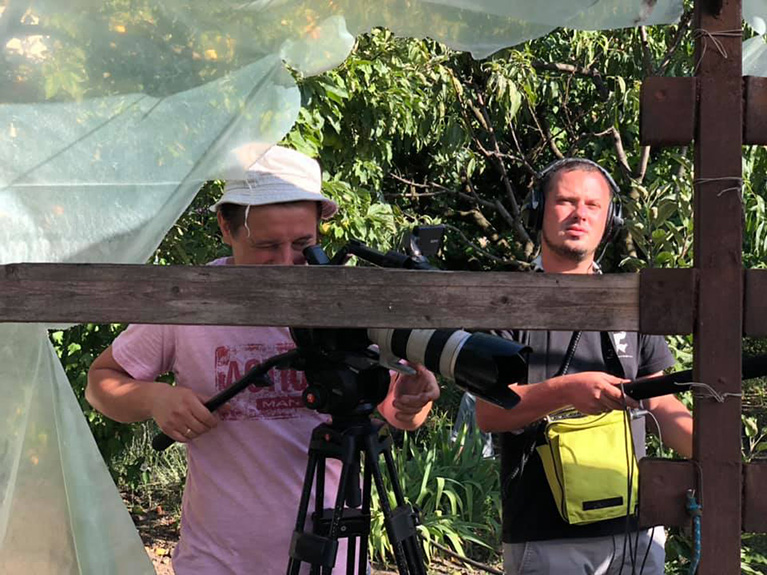Media programs adapt to COVID-19 and counter misinformation

People around the world are encountering misinformation about COVID-19, commonly known as the coronavirus. IREX’s media development projects are working with journalists, media organizations, and other institutions to prevent the spread of false information.
False information about the coronavirus ranges from myths that people of certain races are more susceptible to the disease to deadly suggestions to use household bleach to treat symptoms. Not only can this misinformation contribute to xenophobia, it can dissuade people from adopting social distancing measures, prevent people from seeking treatment, or cause people to hurt themselves.
Here are some examples of how IREX’s media programs and partners are countering misinformation about the coronavirus and adapting to social distancing:
- Through the Advancing Integrity in Media program in Indonesia, IREX and our partner the University of Notre Dame have created an online public service announcement video to curb the spread of harmful and misleading health information. The PSA addresses the flood of COVID-19 misinformation by promoting core Learn to Discern concepts that help prevent the spread of misinformation. The project will release three versions of this PSA, conduct user testing, and track the spread of the PSA among its target audience—those who have relatively low levels of media and information literacy.
- The Creating Content Connections in Moldova program approached the creators of the popular Moldovan TV sitcom Italia Patria Nostra, which the program helped develop last year through its content development fund, to add an episode on misinformation about the virus. Already known for poignant, humorous commentary on life, habits, and stereotypes in Moldova, the Italia Patria Nostra episode aims to generate discussions about how people are susceptible to misinformation and can carelessly spread false information.
- The Georgian Media Partnership Program and Ukraine Media Partnership Program are compiling information about how media outlets are adapting their work to COVID-19. The programs are facilitating information sharing between online, broadcast, and print outlets in Georgia, Ukraine, and the United States to help media outlets learn from each other's experiences.
- The Learn to Discern in Education (L2D-Ed) program is conducting online trainings and workshops for teachers and administrators on media literacy topics ranging from curriculum integration to empathy building. The project recently welcomed its final cohort of 256 schools and started training new project participants, including through the online course Very Verified.
- The Learn to Discern in Georgia project adapted its training for online delivery in a way that preserved Learn to Discern’s interactive approach. By June 24, IREX had trained more than 430 youth trainers, who in turn trained more than 3,200 of their fellow Georgians.
- The Media Empowerment for a Democratic Sri Lanka program launched media salons to educate the public about coronavirus misinformation. The program also published tips and resources for journalists who are covering COVID-19.
- The Media for Transparent and Accountable Governance (M-TAG) program's media partners have produced stories on the impact of COVID-19 in Georgia, with support from IREX's trainers. M-TAG worked with partners to strengthen their online presence and rethink their advertising plans (for example, to target open essential businesses).
- The Georgian Charter of Journalistic Ethics—a partner of the Media for Transparent and Accountable Governance program—released a statement with recommendations for how journalists should cover the topic. The purpose of the statement is to help journalists inform the public without causing undue alarm or amplifying xenophobic sentiments. The Charter’s suggestions include using multiple sources to confirm information, avoiding the words killer and deadly to describe the virus, and maintaining patients’ anonymity, which includes protecting personal details like their ethnicity.
- The Media Literacy in the Baltics program is using real examples of manipulative information and journalism on COVID-19 to train citizens to recognize misinformation. The program has also developed a training presentation based on IREX’s #WashYourNews campaign in three languages for youth trainers to use in citizen trainings. The presentation consists of tips, exercises, examples, and quizzes and covers the major elements of IREX's Learn to Discern approach to media literacy.
- The Strengthening Media Systems program in Serbia is working with local media organizations to help them retain audiences, increase engagement, and strengthen the organizations’ business prospects, while countering misinformation. For example, Danas Newspaper launched a newsletter about COVID-19, which helped boost its membership base by nearly 60% in March. One of Danas Newspaper’s articles reported on examples of misinformation about COVID-19.
- The participants in the Tafakkar program (“Think” in Arabic) redesigned their activities in response to the new context and restrictions. The first cohort of participants have implemented 10 media initiatives and productions, reaching an audience of more than 50,000 Jordanians. The Digital Age Kids initiative, for example, used Google Meet to deliver to more than 110 parents four seminars about cyberbullying and the risks of media abuse and overuse. The My Law, My Rights initiative produced a series of videos on Jordan’s cybercrime law and media law and policies, reaching more than 24,000 viewers so far.
- The Youmakken program (Youth Media Action, Knowledge, and Engagement, or “Empowering” in Arabic) has delivered training workshops on active citizenship, critical thinking, Learn to Discern, and media production in four regions of Jordan. To promote social distancing among participants during in-person sessions, each session has a maximum of nine students, field trainers have contributed more of their time, partners have been creative in arranging for outdoor venues in gardens and courtyards, and everyone has worn masks and gloves. During the first 10 days of resuming in-person activities, the program trained 140 young people.
Media systems are essential to public safety during a time of crisis. If you have questions about IREX’s work on this issue, please write to contact.im@irex.org.
For all other inquiries about the virus, please consult the World Health Organization’s information about the coronavirus.